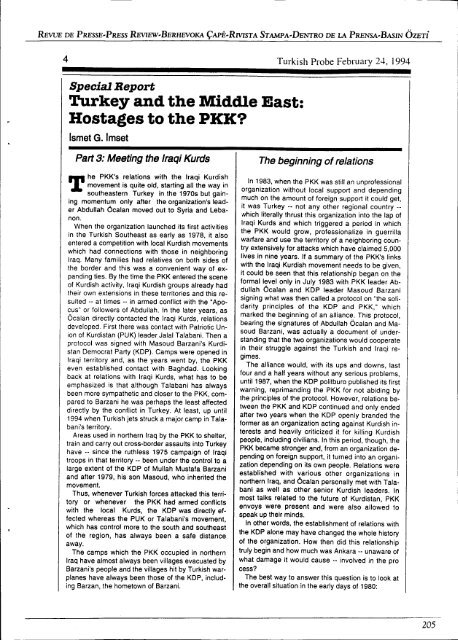Bulletin de liaison et d'information - Institut kurde de Paris
Bulletin de liaison et d'information - Institut kurde de Paris
Bulletin de liaison et d'information - Institut kurde de Paris
You also want an ePaper? Increase the reach of your titles
YUMPU automatically turns print PDFs into web optimized ePapers that Google loves.
REVUE DE PRESSE-PRESS REVIEW-BERHEVOKA ÇAPÊ-RWISTA STAMPA-DENTRO DE LA PRENSA-BASIN OZETi<br />
4 Turkish Probe February 24, 1994<br />
Special Report<br />
Turkey and the Middle East:<br />
Hostages to the PKK?<br />
Ism<strong>et</strong> G. Ims<strong>et</strong><br />
Part 3: Me<strong>et</strong>ing the Iraqi Kurds<br />
he PKK's relations with the Iraqi Kurdish<br />
T movement is quite old, starting all the way. in<br />
southeastern Turkey in the 1970s but gaIning<br />
momentum only after the organization's lea<strong>de</strong>r<br />
Abdullah Öcalan moved out to Syria and Lebanon.<br />
When the organization launched its first activities<br />
in the Turkish Southeast as early as 1978, it also<br />
entered a comp<strong>et</strong>ition with local Kurdish movements<br />
which had connections with those in neighboring<br />
Iraq. Many families had relatives on both si<strong>de</strong>s of<br />
the bor<strong>de</strong>r and this was a convenient way of expanding<br />
ties. By the time the PKK entered the scene<br />
of Kurdish activity, Iraqi Kurdish groups already had<br />
their own extensions in these territories and this resulted<br />
-- at times -- in armed conflict with the "Apoeus"<br />
or followers of Abdullah. In the later years, as<br />
Öcalan directly contacted the Iraqi Kurds, relations<br />
<strong>de</strong>veloped. First there was contact with Patriotic Union<br />
of Kurdistan (PUK) lea<strong>de</strong>r Jalal Talabani. Then a<br />
protocol was signed with Masoud Barzani's Kurdistan<br />
Democrat Party (KDP). Camps were opened in<br />
Iraqi territory and, as the years went by, the PKK<br />
even established contact with Baghdad. Looking<br />
back at relations with Iraqi Kurds, what has to be<br />
emphasized is that although Talabani has always<br />
been more sympath<strong>et</strong>ic and closer to the PKK, compared<br />
to Barzani he was perhaps the least affecte~<br />
directly by the conflict in Turkey. At least, up until<br />
1994 when Turkish j<strong>et</strong>s struck a major camp in Talabani's<br />
territory.<br />
Areas used in northern Iraq by the PKK to shelter,<br />
train and carry out cross-bor<strong>de</strong>r assaults into Turkey<br />
have -- since the ruthless 1975 campaign of Iraqi<br />
troops in that territory -- been un<strong>de</strong>r the control to a<br />
large extent of the KDP of Mullah Mustafa Barzani<br />
and after 1979, his son Masoud, who inherited the<br />
movement.<br />
Thus, whenever Turkish forces attacked this territory<br />
or whenever the PKK had armed conflicts<br />
with the local Kurds. the KDP was directly effected<br />
whereas the PUK or Talabani's movement,<br />
which has control more to the south and southeast<br />
of the region, has always been a safe distance<br />
away. .<br />
The camps which the PKK occupied in northern<br />
Iraq have almost always been villages evacuated by<br />
Barzani's people and the villages hit by Turkish warplanes<br />
have always been those of the KDP, including<br />
Barzan, the hom<strong>et</strong>own of Barzani.<br />
The beginning of relations<br />
In 1983, when the PKK was still an unprofessional<br />
organization without local support and <strong>de</strong>pending<br />
much on the amount of foreign support it could g<strong>et</strong>,<br />
it was Turkey -- not any other regional country --<br />
which literally thrust this organization into the lap of<br />
Iraqi Kurds and which triggered a period in which<br />
the PKK would grow, professionalize in guerrilla<br />
warfare and use the territory of a neighboring country<br />
extensively for attacks which have claimed 5,000<br />
lives in nine years. If a summary of the PKK's links<br />
with the Iraqi Kurdish movement needs to be given,<br />
it could be seen that this relationship began on the<br />
formal level only in July 1983 with PKK lea<strong>de</strong>r Abdullah<br />
Öcalan and KDP leacler Masoud Barzani<br />
signing what was then called a protocol on "the solidarity<br />
principles of the KDP and PKK," which<br />
marked the beginning of an alliance. This protocol,<br />
bearing the signatures of Abdullah Öcalan and Masoud<br />
Barzani, was actually a document of un<strong>de</strong>rstanding<br />
that the two organizations would cooperate<br />
in their struggle against the Turkish and Iraqi regimes.<br />
The alliance would, with its ups and downs, last<br />
four and a half years without any serious problems,<br />
until1987, when the KDP pOlitburopublished its first<br />
warning, reprimanding the PKK for not abiding by<br />
the principles of the protocol. However, relations b<strong>et</strong>ween<br />
the PKK and KDP continued and only en<strong>de</strong>d<br />
after two years when the KDP openly bran<strong>de</strong>d the<br />
former as an organization acting against Kurdish interests<br />
and heavily criticized it for killing Kurdish<br />
people, including civilians. In this period, though, the<br />
PKK became stronger and, from an organization <strong>de</strong>pending<br />
on foreign support, it turned into an organization<br />
<strong>de</strong>pending on its own people. Relations were<br />
established with various other organizations in<br />
northern Iraq, and Öcalan personally m<strong>et</strong> with Talabani<br />
as well as other senior Kurdish lea<strong>de</strong>rs. In<br />
most talks related to the future of Kurdistan, PKK<br />
envoys were present and were also allowed to<br />
speak up their minds.<br />
In other words, the establishment of relations with<br />
the KDP alone may have changed the whole history<br />
of the organization. How then did this relationship<br />
truly begin and how much was Ankara -- unaware of<br />
what damage it would cause -- involved in the pro<br />
cess?<br />
The best way to answer this question is to look at<br />
the overall situation in the early days of 1980:

















